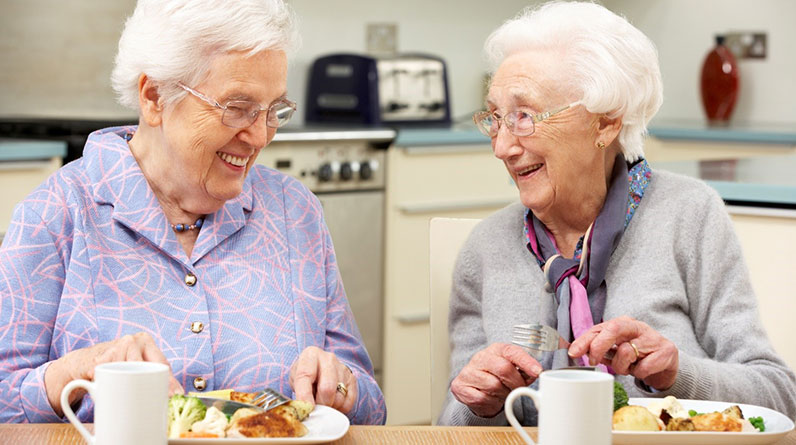
Healthy Eating Habits
Eating a healthy diet is important for people of all ages, but it becomes increasingly important as we get older. Proper nutrition can help seniors maintain their physical and cognitive health and prevent or help manage chronic diseases such as diabetes, heart disease, and osteoporosis. Eating proper nutrients can also help to maintain healthy joints and prevent inflammation.
It can be challenging, however, for seniors to maintain a healthy diet due to a variety of factors, including physical limitations, changes in appetite and taste, and financial constraints. There are, however, several simple but effective tips for improving healthy eating habits as we age, and these can be implemented with ease.
The following are some tips for seniors to ensure that they are eating a healthy and balanced diet.
5 Tips for Eating Healthy As A Senior
Know what a healthy plate looks like. The saying “we are what we eat” holds true for all ages, but especially for seniors. Ensuring that each meal contains a balance of the various food groups is important for feeling well.
A healthy plate should include:
- Lean protein sources – such as lean meats, seafood, eggs, and beans. These foods provide essential amino acids that are necessary for building and rebuilding tissues in the body.
- Fruits and vegetables – a good trick is to aim to include a variety of colors, such as orange, red, green, and purple. These foods are high in fiber, vitamins, and minerals and can help to lower the risk of medical illness such as heart disease and cancer.
- Whole grains – choose whole grains such as brown rice and whole wheat pasta, which are high in fiber and nutrients. Avoid refined grains such as white bread and pasta, which lack nutrients and can lead to weight gain.
- Low-fat dairy – milk and its alternatives (such as almond milk or soy milk) are good sources of calcium, which is important for maintaining strong bones. Choose low-fat or non-fat options to reduce the intake of saturated fat.
Make Sure the Meal Contains Important Nutrients
In addition to the food groups mentioned above, there are certain nutrients that are particularly important for seniors to include in their diet.
- Fiber – helps to prevent constipation and maintain a healthy weight. Good sources include fruits, vegetables, whole grains, and legumes.
- Vitamin D – helps the body absorb calcium and is important for bone health. It can be difficult for seniors to get enough vitamin D from food alone, so it may be necessary to take supplements to maintain healthy levels.
- Reduce Sodium Intake – it’s important to limit the intake of sodium as we age since high levels can contribute to high blood pressure and other health problems, such as kidney disease. Choose foods that are low in sodium, and be mindful of added salt when cooking and eating.
Read the Nutrition Facts Label
The nutrition label on packaged foods can be a helpful tool for understanding the nutrients that a food contains. Pay particular attention to the serving size and the amount of sodium, sugar, and saturated fat. Look for foods that are high in nutrients, low in added sugars, and low in unhealthy fats.
As a simple tip, when grocery shopping, take a look at the perimeter of the store. It’s here where you’ll find all the whole foods that are healthy without the need to read labels so closely.
Use Recommended Servings
It’s important to pay attention to portion sizes, as seniors may have a slower metabolism and may not need as many calories as they did when they were younger.
The USDA recommends the following serving sizes for seniors:
- Fruits: 1 cup of fruit or 1 medium fruit serving
- Vegetables: 1 cup of raw or cooked vegetables or 2 cups of leafy greens
- Grains: 1 slice of bread or 1/2 cup of cooked grains
- Protein: 3 ounces of cooked meat, poultry, or fish
Stay Hydrated
Proper hydration is important for maintaining overall health and becomes even more important as we age. Seniors may be more prone to dehydration due to factors such as a decreased sense of thirst, certain medications, and changes in kidney function.
To ensure that they are getting enough fluids, seniors should aim to drink small amounts of fluids throughout the day. Water is the best choice, but other beverages, such as milk or juices, can contribute to hydration. It’s also a good idea to avoid sugary drinks and alcohol, as these can lead to dehydration.
Final Thoughts
Eating a healthy and balanced diet is important for seniors to maintain their physical and cognitive health and to prevent or manage chronic diseases.
Some tips for seniors to follow include learning what a healthy plate looks like, making sure the meal contains important nutrients, reading the nutrition facts label, using recommended servings, and staying hydrated.
By following these tips, seniors can ensure that they are getting the nutrients they need to stay healthy and active as they age.
